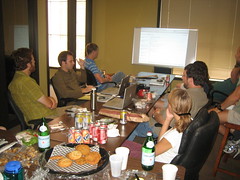Retrenchment: team reaction
November 27th, 2006 by Hugh
I’ve been ringing round the Exbiblio team looking for reaction to the news of the retrenchment and staff cut-back. Not everyone has been at their desks, but this is what I’ve been told so far.
Brydie Ragan, who has been just five days into her job as Exbiblio’s “hardware evangelist”, says that she was still learning about Exbiblio, its people, and its projects. Even so, she wasn’t bowled over, as she’s worked on startups before, including one of her own, and “there are always surprises”. She adds that it’s just part of “life’s great adventure.”
Engineer, Brendan McNichols, tells me: “In a sense, I’m not surprised because it’s a startup and we’ve been spending a lot of money on a piece of hardware that was ridiculously expensive to bring to market. Where the surprise comes in, is that just a week previous, things had been seeming to be going okay. We’ve been getting software stuff on track, and then we’ve been hiring , and usually that’s a sign that things are going well.”
Ian MacDuff, the engineer who has been co-ordinating the relationship with contractors Synapse, tells me that he has been discussing with Exbiblio’s management how to wrap-up the hardware project. He suggested that they should document the oPen’s architecture and explain how it works. However, he adds, “I’m not feeling hyper-motivated. I would like to be, but I’m pretty disappointed about the whole thing.”
(update) Lauren Summers tells me: “I was surprised at the announcement last week because it was very sudden, and am sad to break up from this team of people. I do hope Exbiblio can figure out a way to make it work. The growing idea of the (working) device over the past months, and seeing each new development, makes the idea of not using it soon feel like a loss.”
Adam Behringer will be writing shortly about his own impressions.
Speaking to a couple of others off-the-record, I get the impression that there is not a huge deal of surprise about the event itself – these things happen in startups – but the timing and suddenness was unexpected. There is some bafflement about why the management appeared not to know about potential problems – even to the extent that they were hiring recently.

